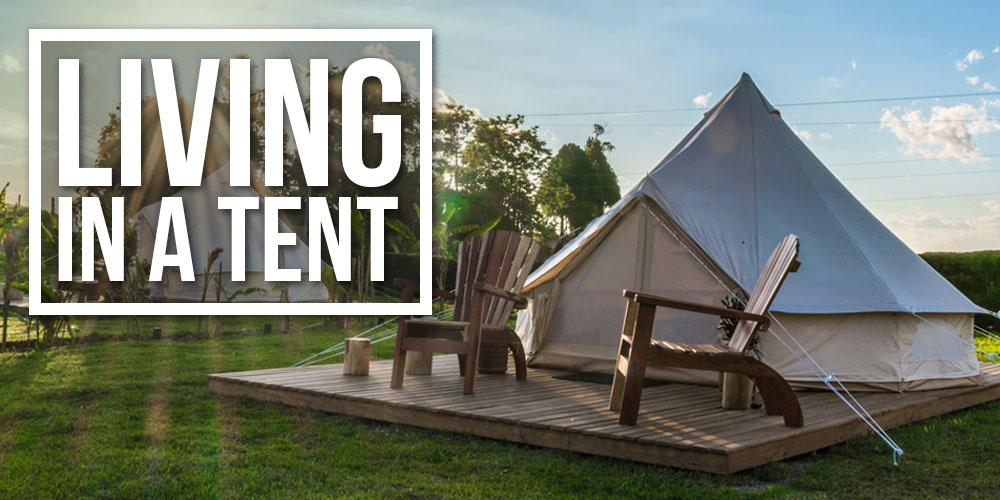
NAVIGATION
As idyllic and hipster as living in a tent full time may look on Pinterest, it’s not something you can just decide you’re ready for overnight. You will inevitably face many challenges when you decide to move into a tent, but the rewards are undeniably worth it.
I’ve found that my friends who have taken the risk to live full time in a tent have grown deeply from it and would not change their experience for anything. I think that’s often the paradox of life; things with the biggest risk often reap the greatest rewards.
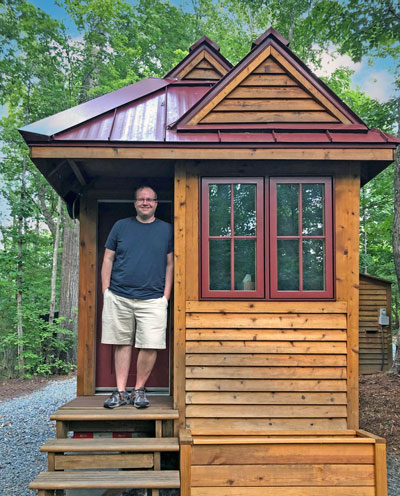
Hi, I’m Ryan
I’ve lived in a tiny house for the past 10 years and have fallen in love with the freedom, mobility, peace of mind, and financial freedom the lifestyle has gifted me. Living in a tent can give you all of that and more.

What You Need To Know About Living In A Tent

There is a plethora of alternative living options out there like a tiny house, van life, a cargo trailer, or even a fancy yurt. A lot of these routes are much less rugged and involved than moving into a canvas tent full time.
If you’re looking for a taste of freedom and adventure without sacrificing some of the amenities you’re used to, you may want to try out a different option before moving your whole family into a tent in the woods. However, living in a tent doesn’t have to be entirely off grid. There are many ways to integrate the amenities you need into your nice canvas tent.
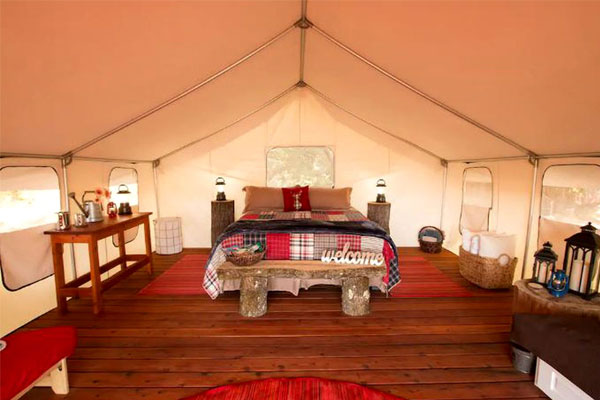
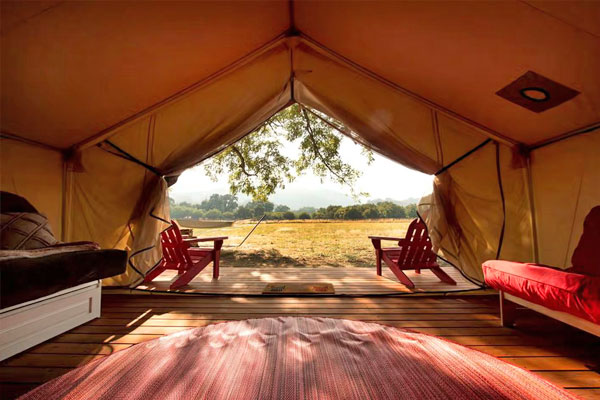
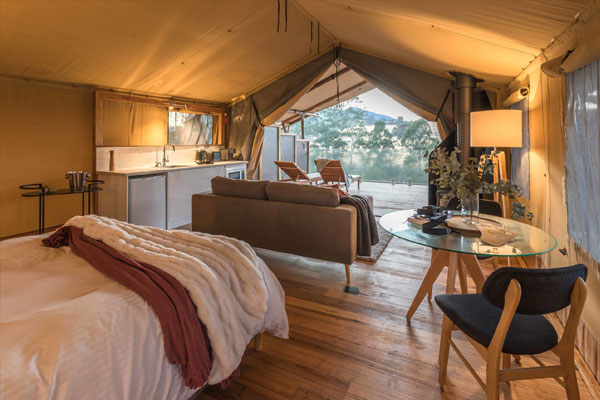
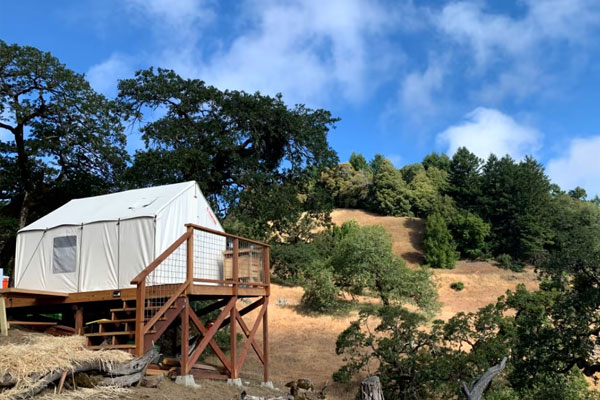
Living full time in a tent is no joke. Making this move isn’t the same as going camping on the weekend and snapping back to reality afterwards. Moving into a tent as your full-time home means embracing what nature has to offer 24/7. This can be a wildly rewarding and life altering adventure if you’re up to the challenge.
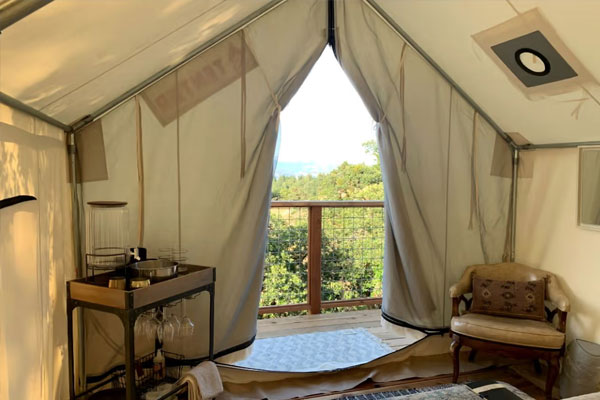
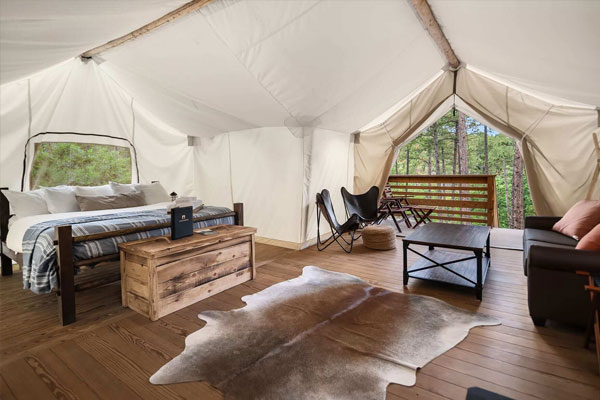
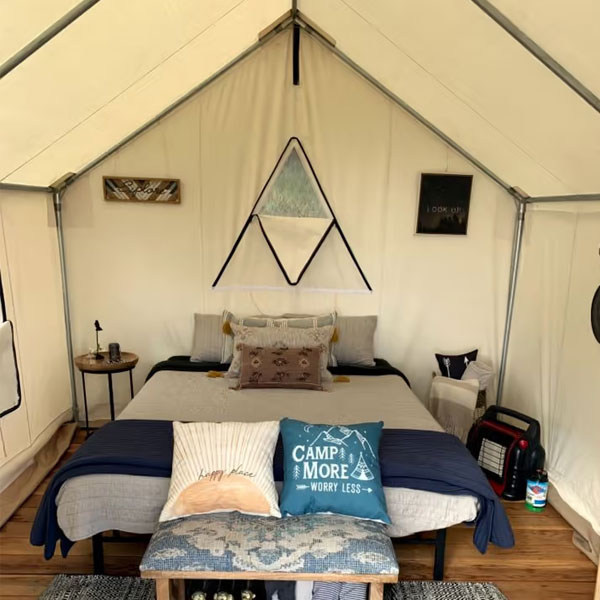
How To Decide If I’m Ready To Live In A Tent
If you’re considering moving into a tent by yourself, with your partner, or even with your family, there are several things I’d advise you to consider before nailing stakes in the ground. When you feel ready to take this leap, set aside some time to ask yourself important questions about your comfort expectations, lifestyle, and what you’re trying get out of this life change.
Before Living In A Tent, Ask Yourself:
- Are my typical daily life luxuries possible with tent life, and, if not, am I willing to give up those luxuries every day?
- Do I have a plan to adjust my work life to fit my move into a tent?
- Or, if I don’t plan to work while living in my tent, do I have the savings to tide me over?
- Tent life will give me less security (you can’t lock your door). Am I okay with being more vulnerable in that way?
- Am I okay with facing the elements and making adjustments to protect my home from weather and wildlife?
- Do I have a plan for integrating utilities into my tent?
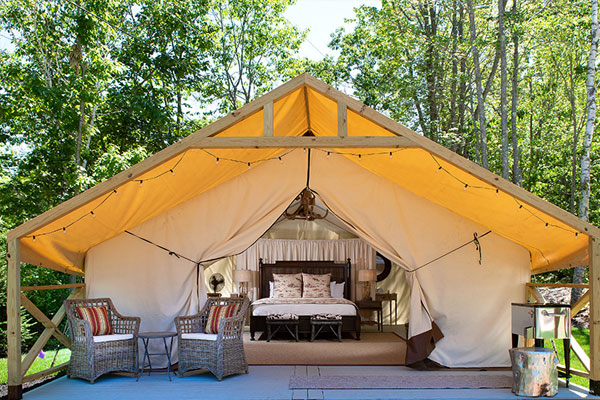 I am not posing these questions to talk you out of trying out tent life. I wouldn’t make a whole blog post about something I didn’t think has a ton of value and improves lives!
I am not posing these questions to talk you out of trying out tent life. I wouldn’t make a whole blog post about something I didn’t think has a ton of value and improves lives!
Living in a tent full time will teach you so much about yourself, your needs, and what you can do without. However, I think it’s super important that you know what you’re getting into before you make a rash decision you end up not being ready for!
Is It Legal To Live In A Tent Full Time?
Another huge consideration when trying to live in a tent full time is understanding where you’re legally allowed to camp. City planning as well as national and state zoning laws prohibit you from being able to pitch a tent anywhere you want. These laws are also going to fluctuate a ton based on where you live.
If you’re wanting to move from campground to campground in your tent, or live in a campground for a long period of time, what’s allowed is going to depend on the rules of the campground or park. The last thing you want to have to deal with is getting fined for pitching your tent somewhere you aren’t allowed.
It’s pretty common for state and national parks to limit you to two weeks at a time in their campground. After two weeks, the camper must move out of the area beyond a 25-mile radius, according to the National Bureau of Land Management. You can find out the exact limitations by going on the park’s website or calling the park directly.
 If you are just wanting to pitch your tent on your own land, you also have to jump through some hoops to make that happen. In the United States, it is illegal to live in a car, tent, or other housing type that isn’t deemed suitable for living via national law.
If you are just wanting to pitch your tent on your own land, you also have to jump through some hoops to make that happen. In the United States, it is illegal to live in a car, tent, or other housing type that isn’t deemed suitable for living via national law.
Unfortunately, these housing laws still exist even if you hope to live in a tent on your own land. While society has become a lot more progressive in the last decade as far as accommodating alternative living styles, national zoning laws haven’t exactly followed suit.
In order to live full time in a tent on your own land, you will need either a structure with a building permit or an existing camping permit. Depending on which state you live in, it may be possible to get a temporary camping permit that can get renewed every month or year so you can live full time in a tent on your land.
The devil is always in the details with things like this, so be sure to contact your local reps to find out the exact rules in your own municipality for living in a tent.
Resources For Finding Free Campsites
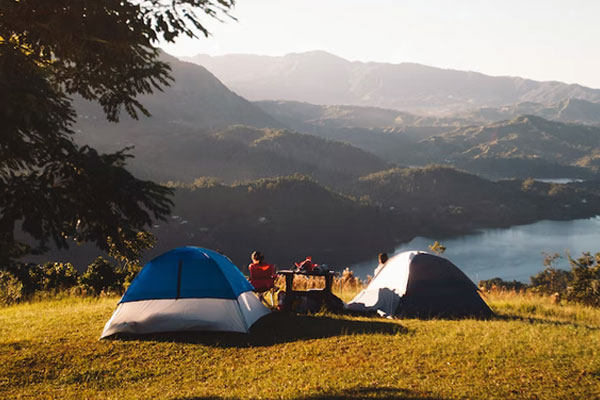
The Benefits Of Living In A Tent Full Time

If there is so much to deal with before living in a tent, why do so many people love adopting the lifestyle? I have several friends who have tried tent living, and I don’t know a single person who regretted it.
I think there is something about the Walden-esque retreat into nature that reignites a flame in us as people. I’m not a mystic by any means — I tend to focus on the here and now. But I do think there is a lot of value that people gain by forgoing the status quo, whether it’s for a month, a year, or a weekend, while soaking up what nature has to offer.
Living In A Tent Saves Money
While the mental benefits of tent life are also immense, I’d say the advantage people talk about most is the financial one. When living in a tent, you don’t have to worry about paying rent to a landlord or spending a ton on water and utility bills.
The cost of tent living for you will definitely depend on your personal setup and how many amenities you plan into your canvas tent. Still, it’s inevitably going to be cheaper than any apartment.
Tent Living Lowers Your Carbon Footprint
Living in a tiny house for the past decade has taught me a lot about valuing the environment. Living in a tent full time is one of the best ways to reduce your carbon footprint and protect the earth. When living in a tent, you cut out most of your power and gas usage, which is a game changer for how much energy you’re consuming.
Life In A Tent Brings Freedom And Mobility
One of the most attractive aspects of tent life for people is the amount of sheer freedom the lifestyle provides. Similar to many other forms of alternative living, tent life gives you the ability to pick up everything you own and move to any campsite, park, city, or state you please.
Living In A Tent Forces You To Grow
Personal growth is one of the biggest benefits of moving into a tent. Like I mentioned before, it can be a challenge that isn’t for the faint of heart. However, taking this leap will teach you so much about yourself, your limitations, and what you’re able to handle out in the wilderness. You may truly surprise yourself.
Tent Life Is Good For Your Health
Spending more time outside is medically proven to be great for the health of our minds and bodies. Plants release phytoncides that help your body regulate itself, reduce toxins, and improve your immune system. Studies also prove that spending time in nature increases your mental stability and happiness.
Challenges Of Living In A Tent

Of course, living full time in a tent will also present a fair number of challenges to overcome. Here are some of the hardest parts that full-time tent dwellers talk about most often.
You’ll Have To Face Animals And Bad Weather
Being closer to the elements certainly means you’ll feel more of their effects. Living full time in a tent means that you’ll have to take extra precautions to protect your home from bad weather and wildlife surrounding your campsite.
It’s also a harsh reality that, even if you invest in a very durable canvas tent, it might be destroyed by a storm. Your food may be ravaged by racoons even if you hoist it into a tree. There are just some sacrifices you make and risks you take when building a home in the great outdoors.
Sanitation And Utilities Can Be A Challenge In A Tent
Setting up sanitation and utilities in a tent is a beast of its own. It’s a challenge to navigate plumbing, waste removal, water usage, electricity, and other utilities when you aren’t connected to public systems. Tent users usually have to go the off-grid route when it comes to utility setup.
Safety Concerns Are Harder To Address In A Tent
One thing many tent life hopefuls forget to consider is the lack of access to medical help in a remote location. If you’re living in the boondocks, it may be harder to get the help you need if an injury or illness comes up. It’s vital that you create a gameplan specific to your personal medical needs and safeguard you and your family against possibly emergencies in your tent.
Tent Life Can be Lonely
I think this is one downside of tent life that campers don’t think about as often. It seems obvious to consider all the technical challenges of living in a tent full time, but people forget the social impact.
Think about your life now and how much your social interactions are dependent on frequency of being in the same location. Tent life can be a social challenge when you’re in the woods alone.
Pro Tips For Living In A Tent Full Time

As you can see, living full time in a tent comes with many challenges. Here are some tips to help you make this transition seamlessly.
Protect The Exterior Of Your Tent
Since your tent is going to be exposed to the elements, it’s a good idea to invest in a way to give the exterior of your canvas tent some extra protection. I’d suggest buying a fly sheet to overlay across the top of your tent and protect the fabric from harsh sun, wet rain, or heavy snow.
Invest In Comfortable Flooring For Your Tent
Since you’re going to be living in your tent full time, you don’t want to treat it like any regular old camping tent. Invest in some nice carpet or flooring to add to your tent to cover the ground and make your tent feel more like home. This also provides some extra padding and protection between your feet and the hard ground.
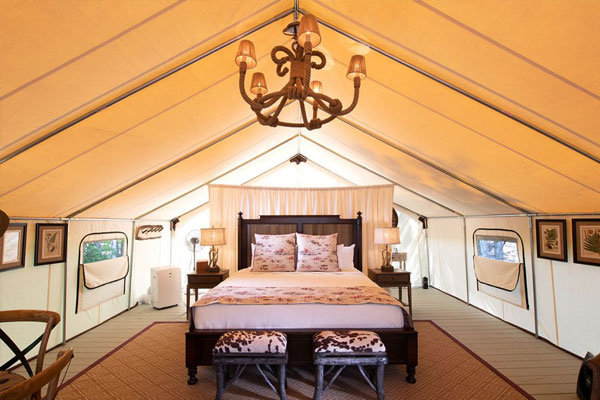
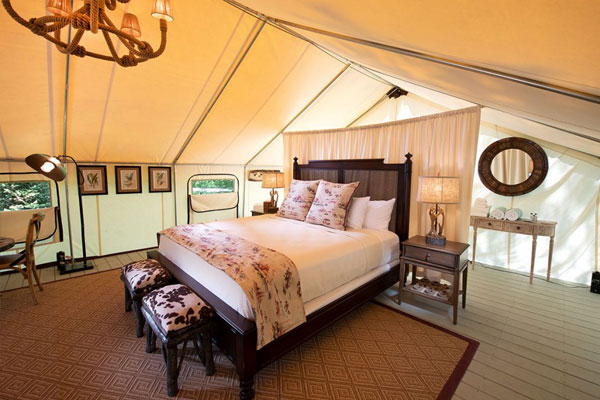
Keep Your Foodstuffs Sealed Tight
Wildlife finding their way into your home is one if the biggest challenges full time tenters face. To prevent critters form getting into your canned goods and frozen meals, make sure all your food is sealed extra tight.
Invest In Locked Storage To Protect Valuables
There isn’t exactly a simple way to lock your tent, so you’ll want to make a plan for your valuable items to prevent them from being stolen while you’re in the woods. I’d suggest either locking your valuables in your car or investing in some sort of lockbox or firesafe to keep your stuff safe.
Use A Rainwater Catchment System
Most of my friends who live in their tents collect rain water to use for drinking and bathing. This way, you don’t have to rely on the city water supply to have access to clean water. There are many ways to set up a rainwater catchment system and tailor it to fit your needs.
Educate Yourself On Wildlife And Plants In Your Area
Take notes on how to protect yourself from wildlife attacks or health concerns from harmful plants. Doing this will give you that extra layer of knowledge to stay safe in your tent.
Living In A Tent In The Winter: What You Need To Know

Like I mentioned above, if you plan to live in a tent year-round, you’re going to run into some problems with weather. So, what do you do when harsh, frigid winters try to run you out of your canvas tent?
Invest In Gear That Will Help You Survive Harsh Winters
It’s super important that you have the right gear to protect yourself from freezing while living in a tent. Don’t make the rookie mistake of assuming you’ll be fine to save an extra buck — this is how inexperienced campers lose their lives every single year.
I know that’s a little morbid, but the severity warrants a serious response. When doing something like living in the wilderness full time, safety should be your first priority, always.
Necessary Gear For Winter Camping
- Cold Weather Sleeping Bag
- Insulated Sleeping Pad
- Sleeping Mat
- Cold Weather Clothing
- Wood Burning Stove
- Cooking Stove Platform
- Lamp For Long Nights
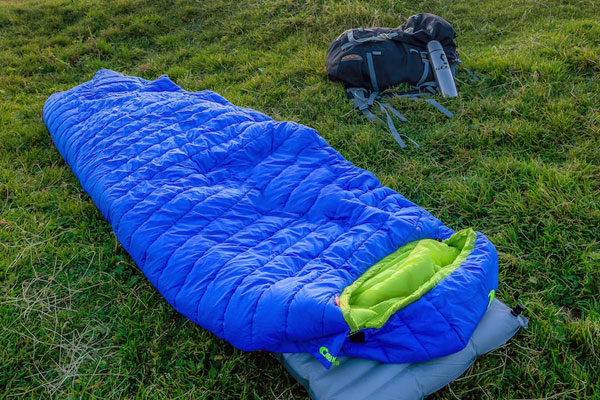
Buy The Best Type Of Tent
When you set out to buy your tent, consider if you plan to live in it through the winter and let that inform the type of tent you invest in. For your tent to be able to withstand harsh winters, it needs to be durable and able to insulate itself.
It’s also wise to buy a tent that is water repellent to keep unwanted moisture from rain or snow out of your living space. Canvas wall tents are the best type of tents to handle all four seasons because this type of tent is built with durable cotton material that withstands weather damage.
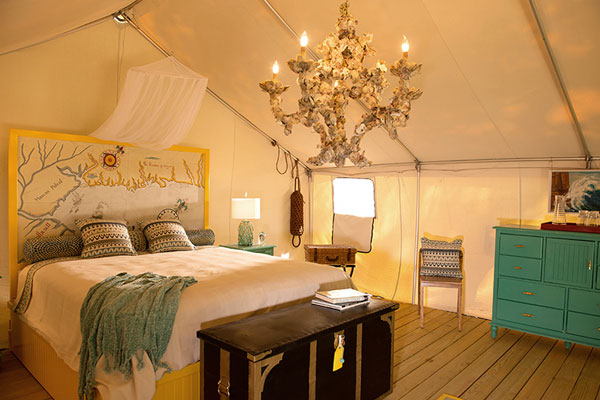
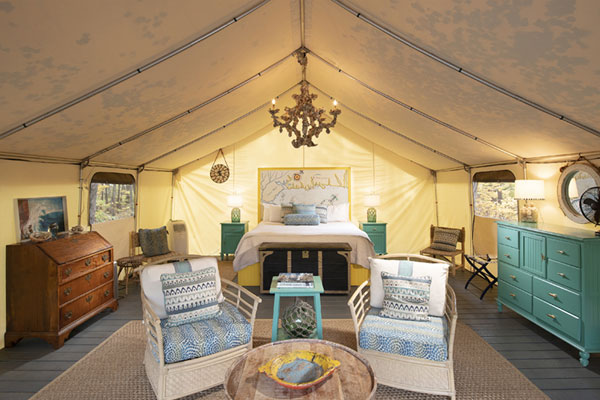
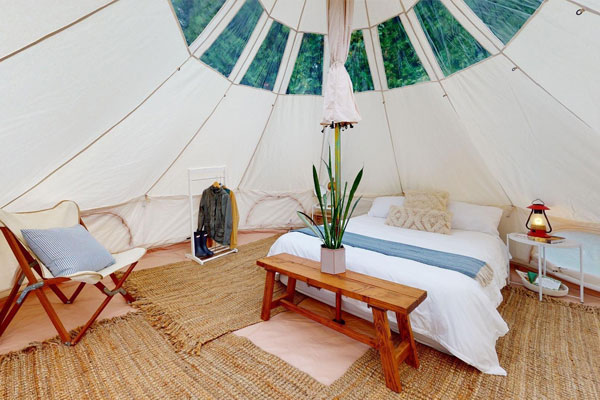
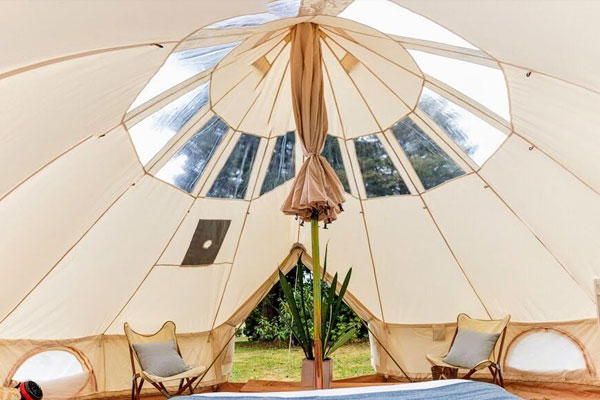
Plan Your Meals Ahead Of Time
In crazy winter weather, it may be more difficult to go out and retrieve the foodstuffs you’ll need to survive. Due to this, you’ll want to put in the extra time to plan your food for the winter ahead of time, like the settlers did back in the day.
Some great options for preserving food through harsh winters are canned goods, because they stay good for a long time and can be cooked over a fire at any time. Dehydrating food and relying on frozen meals are also great options for winter living. Whatever you do, keep in mind that a healthy caloric intake is vital to staying warm, so don’t skimp or try to diet at this time.
High-Quality Canvas Tents And Where To Buy Them

If you’re planning to live in a tent full time, you want to make sure your tent is durable, strong, and works with your lifestyle and needs. I’ve compiled a list of some brands that carry wall tents, bell tents, and canvas tents built to last longer than a flimsy nylon tent.
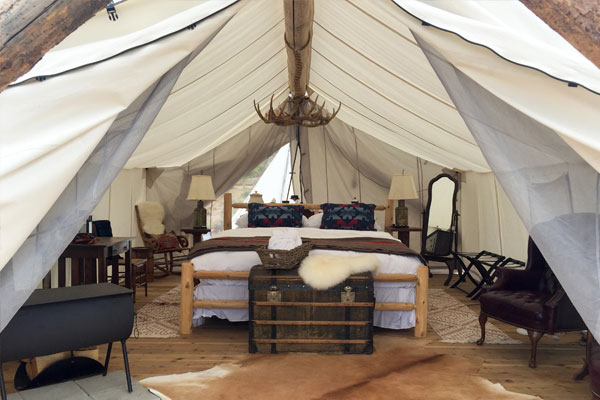
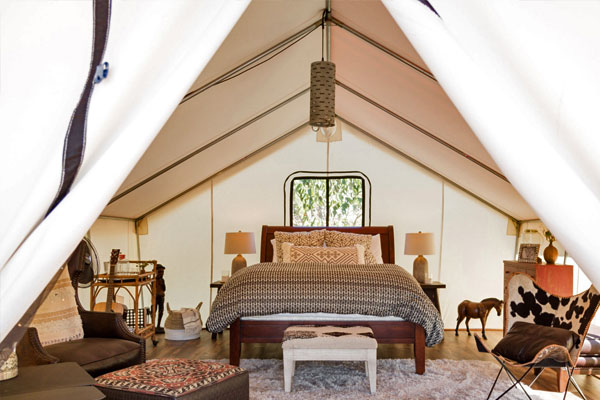
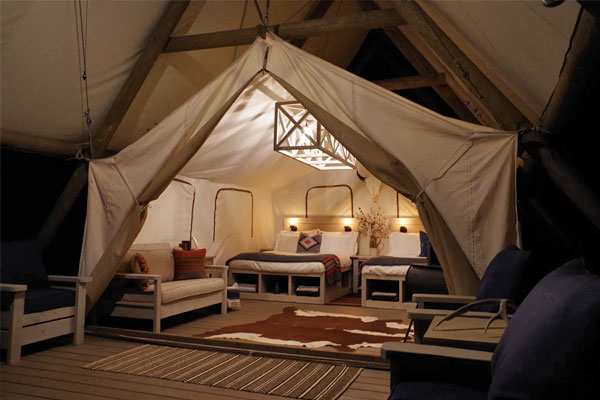
High-Quality Tent Brands
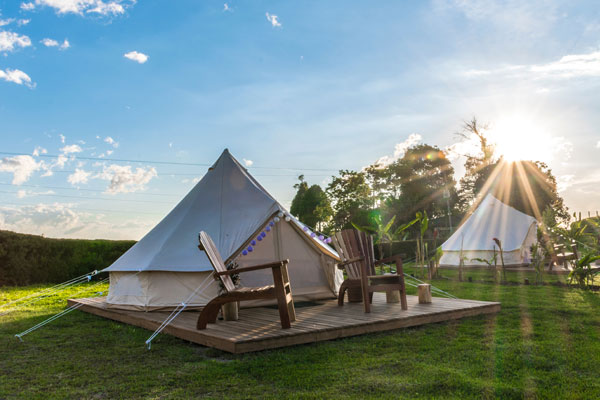
Your Turn!
- Why does living in a tent full time sound like the move for you?
- What steps do you plan to take to make living in a tent your reality?
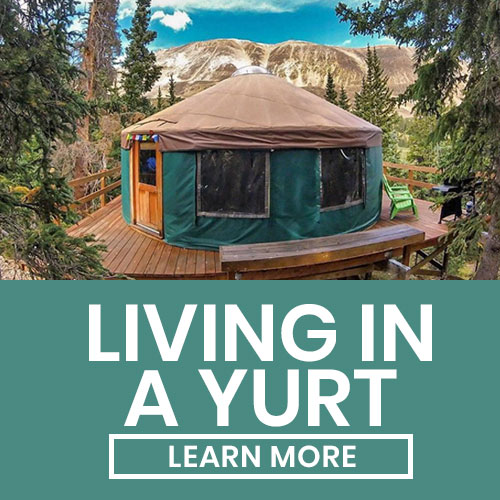





I’ve been told to build a pole barn and just move in there, via an RV, tent, tiny home. One would be safe from all elements. The water, toilet, electricity would have to be further issues to deal with. One could even park their vehicle in there to keep safe as well. Stocking wood could also be solved to keep it dry. One would also have to live far out and not have gabby neighbors. Just a thought!
In unusually cold weather, I pitch a tent indoors, with quilts and blankets thrown over.
The temperature inside is 5 degrees higher than ambient.
Does anyone else do this?
So where would you recommend living in a tent 365 days a year and not having to move? I live in Las Vegas so I would consider Nevada, New Mexico, Arizona, California, Oregon, Washington, Utah, Wyoming, Idaho or Montana. Prefer not too cold but not against it.
Thank you for the Intel… Could you post more things about city dwelling holding a full-time job while living in a tent…SLC UTAH
I would love to learn more!
During the Early Times, I lived in a 2018 Elantra GT Sport hatch, staying mostly in National Forests & BLM land in the Southwest. I’m now looking at a piece of land for a permanent home base (address) in NM, and setting up a tent as residence as there are nice restrictions. The weather is probably more tolerable compared to other places, but it’s the wind and killer sun that concerns me. It will eat a cheap tarp in a few years.